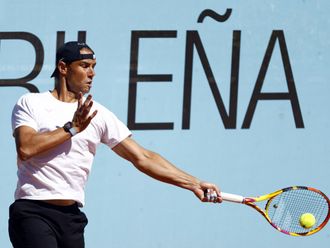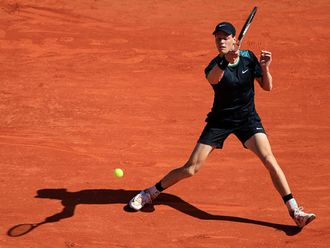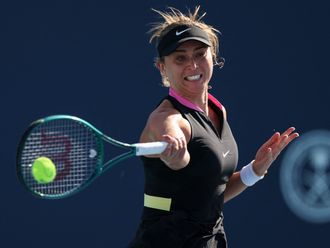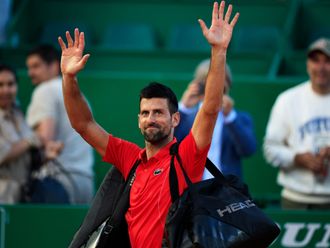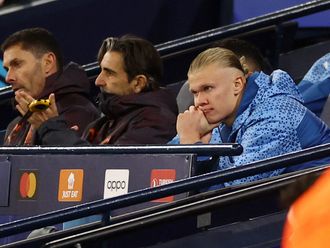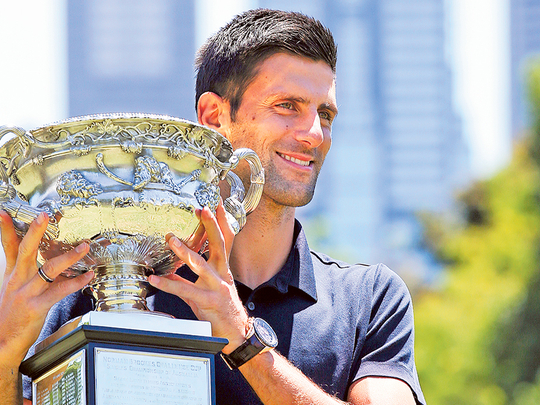
Melbourne: There is a plaque above the players’ tunnel in Melbourne that bears the timeless wisdom of Rod Laver. Who else? “The time your game is most vulnerable is when you are ahead,” it reads. “Never let up.”
The sentiment could have been specifically scripted for Novak Djokovic, the most merciless front-runner his sport has ever known. Even after winning five major titles of the past six, and 34 of his last 35 grand slam confrontations, Djokovic is the man keeping a tightly-laced boot pressed firmly on his opponents’ throats. He has swept to glory in six tournaments in succession, making the final of every event he has entered since January last year. For Andy Murray, the victim once again in Australia of this quite preposterous level of dominance, it is enough to make you cry.
Murray was the picture of torment during a gnawingly familiar concession speech, eyes brimming with tears as he talked about flying home to see wife Kim ahead of the birth of their first child. He longed, patently, for any journey besides the road ending with a sign marked ‘Djokovic’. It does a profound disservice to Murray’s talents that he holds the unenviable distinction of being the only player in the Open era, male or female, to have reached five finals at the same major and never won. The exhaustion in his demeanour spoke not merely of one who had stayed up past 2am the previous night to watch brother Jamie win the doubles title, but of somebody at a loss to understand how to derail the Serb’s supremacy.
For the more Djokovic achieves, the more resolute he is not to surrender his pre-eminence. “I don’t take anything for granted,” he said, after a sixth triumph on the Melbourne Plexicushion that he has annexed as his personal fiefdom. “I don’t want to allow myself to be in that frame of mind. A person can become too arrogant and think he is a higher being than everybody else. You can get a big slap from karma very soon. I don’t want that.”
There was a curiously low-key note in Djokovic’s mood. He marked the moment of victory with the briefest of raised fists, in as muted a reaction to an 11th slam as was possible to conceive. Truly, Melbourne had seen more extravagant celebrations at the Kooyong Classic. At least his coach, Boris Becker, had the good grace to weep copiously at the accomplishment. For Djokovic, though, there are still loftier aspirations to pursue. At his present rate of accumulation, Roger Federer’s record of 17 slams, once deemed unassailable, should tumble in early 2018. More immediately, there is the exquisite perfection of a calendar Grand Slam, perhaps burnished with Olympic gold, to pursue.
He came within two sets of fulfilling it last year, thwarted only by an other-worldly performance by Stan Wawrinka at Roland Garros, but the gap between Djokovic and his pursuers has widened since then. The dream of snaffling all four majors in a single campaign has never looked closer. For Djokovic has morphed, aged 28, into the equivalent of Deep Blue, the chess-playing supercomputer with an answer to his adversaries’ every plot and permutation. Murray’s air of befuddlement was a case in point, as Djokovic’s consummate returning forced him into audacious attempts at winners that he would not otherwise have contemplated. One great frustration for Murray is that there were moments, not least in the pivotal struggle of an 80-minute second set, when his game appeared the more subtle of the two, as he attacked the weaker Djokovic backhand with some devilish slice. But he could not suppress the sheer cussedness of the world No. 1, who mounted several rallies from five metres behind the baseline and who kept striking his groundstrokes too hard and too deep for Murray to muster any sustained attack.
The contrast in energy levels was stark, too. Where Djokovic had spent his extra day off before the final in a hyperbaric oxygen chamber watching Netflix, Murray wore the look of a man who had stayed up later than was prudent to toast his brother’s success. While Murray has made vast strides in improving his stamina for these gruelling slugfests, he often seemed a split-second slower than his irrepressible nemesis. His audible outburst in a horribly one-sided first set - “this is the worst tennis I’ve ever played!” - said much for his exasperation.
Djokovic, characteristically, was the perfect diplomat in the aftermath, consoling Murray by telling him that he hoped fatherhood would bring the same transforming effect that he has enjoyed since the birth of his own son, Stefan. He also offered a touching tribute to Roy Emerson, whose Australian record of six titles he emulated yesterday. Emerson’s son, Antony, died last week of brain cancer, aged 52. There was even a chance for Djokovic, once he had ambled back down the Champions’ Walk, to be embraced by Niall Horan, the Irish star of pop band One Direction. The pair of them have sustained a friendship since meeting in Toronto two summers ago. Horan’s look of astonishment conveyed volumes about the magnitude of Djokovic’s feat in Melbourne, not that the man of the hour would let himself grow complacent on praise. “I heard a nice metaphor, that the wolf running uphill is hungrier than the wolf standing on the hill,” Djokovic said.
“I know that I need to work twice as hard to stay where I am.”
It takes a rare breed of champion to be so garlanded and yet so self-aware. His interviews finished at last, he signed off with a cheery “see you next year”. For Djokovic’s bedraggled rivals, this was perhaps the most chilling message of all.
The Daily Telegraph


